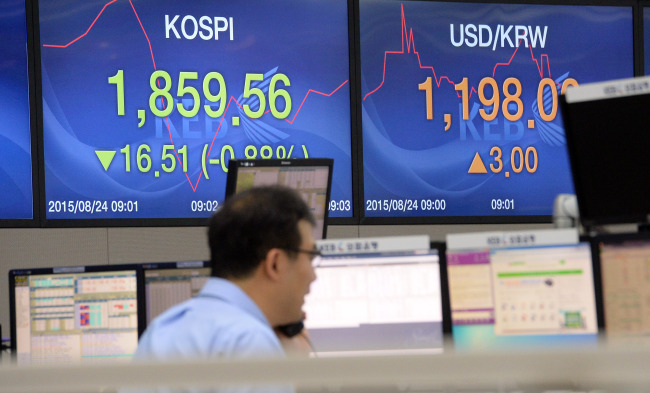Uncertainty in South Korea’s financial markets has widened due to the recent inter-Korean tension and a variety of bearish economic indexes in the U.S. and China.

Stock prices on the main bourse dropped to their lowest level in 25 months. The won-dollar exchange rate touched the 1,200 mark during the session with the Korean currency value falling to a 61-month low on the basis of closing prices.
The benchmark KOSPI lost 46.26 points, or 2.47 percent, from a trading session earlier to close at 1,829.81. It was the lowest in more than two years since it dipped to 1,824.16 on July 10, 2013.
Foreigners dumped shares worth 728.8 billion won ($607.8 million), maintaining their net-seller position for the 13th consecutive session. They net-sold more than 2.5 trillion won worth between Aug. 5 and Aug. 24.
Their aggressive equity disposal led 47 out of the 50 biggest stocks by market capitalization to fall in the session. All of the top 10 stocks, including Samsung Electronics and Hyundai Motor fell by between 2 percent and 5.2 percent.
Samsung Electronics touched a 3 1/2 year low of 1.033 million won during trading, though it closed at 1.079 million won.
In contrast, small and institutional investors posted net-purchases of 297.7 billion won and 401 billion won, respectively.
After peaking at 2,173.41 on April 23, the KOSPI lost 15.8 percent or 343.6 points over the past four months.
The secondary KOSDAQ dropped by 13.72 points, or 2.19 percent, from a session before to close at 613.33.
The U.S. dollar gained 4 won to close at 1,199.0 won after reaching 1,200 won in the morning part of the trading session. On a closing price basis, the dollar showed its strongest in more than five years since it finished 1,204.0 won on July 22, 2010.
After trading at around 1,110 won in the first half of the year, the greenback has continued to rise since July, when the Federal Reserve actively commented on a rate hike.
Local analysts began to raise worries over possible deflation across the world, while the market is paying attention to the U.S. second-quarter gross domestic product, to be publicized on Aug. 27.
“Following China’s economic slowdown and the weakness in emerging markets, concerns are looming as the U.S. stock market tumbled over the weekend,” said research analyst Ryu Yong-seok from Hyundai Securities.
Market participants are pinning hopes on the possibility of China cutting its cash reserve ratio -- effectively monetary easing to boost its economy -- as a second follow-up step to its devaluation of the yuan.
Earlier in the day, Jang Byung-wha, senior deputy governor of the Bank of Korea, presided over an internal emergency meeting to map out steps to closely monitor the currency market against extended volatility.
The group of high-ranking officials of the central bank have agreed to make contingency plans in collaboration with relevant ministries and agencies if necessary.
“In addition to the external risks including the U.S. move to raise interest rate, Chinese stocks’ crash and the devalued yuan, the worsening inter-Korean relations could aggravate the volatility of the financial and foreign exchange market,” the bank said in its briefing of the meeting.
By Kim Yon-se (kys@heraldcorp.com)




![[Herald Interview] 'Amid aging population, Korea to invite more young professionals from overseas'](http://res.heraldm.com/phpwas/restmb_idxmake.php?idx=644&simg=/content/image/2024/04/24/20240424050844_0.jpg&u=20240424200058)











![[KH Explains] Korean shipbuilding stocks rally: Real growth or bubble?](http://res.heraldm.com/phpwas/restmb_idxmake.php?idx=652&simg=/content/image/2024/04/25/20240425050656_0.jpg&u=)

